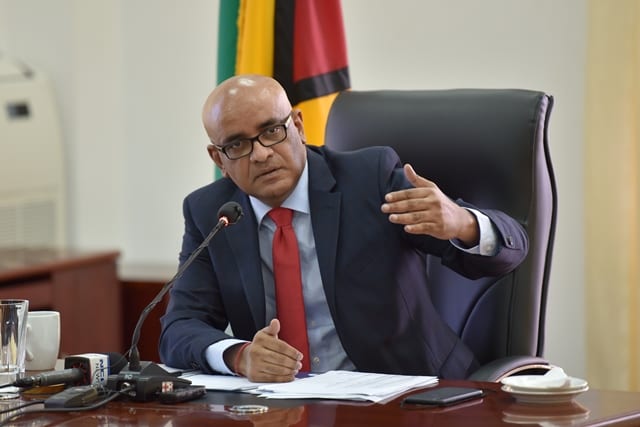The Government of Guyana intends to use the first withdrawal from its Natural Resource Fund to help finance its country’s infrastructural transformation and is pushing back against opposition calls to steeply hike public servants’ salaries.
“If you spend on the capital side and you have a downturn in oil proceeds or revenue you can simply forgo or scale back on some of the projects because it’s not recurrent, it doesn’t come back in the next year’s budget,” Vice President Dr. Bharrat Jagdeo said during a press conference on Thursday.
He said Guyana must not make the mistakes of other oil producing countries that embarked on unsustainable spending then faced challenges as a result of a downturn in oil revenue.
“Because many countries in the world, when they had oil money or they got the windfall what they did; immediately they started paying themselves higher salaries, they started pushing up the current budget of the country, and when the oil money goes, you’re stuck with those expenditures, or when you had a downturn in oil revenue like in so many countries in the world. Trinidad and Tobago we’ve seen it, Suriname, many parts of the world,” Dr. Jagdeo said.
His comments came two months after the government gave public servants a seven percent salary increase. Some were dissatisfied with the amount and held that there should be an increase in salaries that is reflective of the country’s new dispensation as an oil producer. Guyana’s gross domestic product grew 19.9%, but since most of this growth was caused by oil exports, the non-oil economy experienced a much lower 7.7% growth.
The Vice President’s reference to Trinidad and Tobago is not unprecedented in this context. The Inter-American Development Bank examined the case of Trinidad and Tobago in its 2018 report, The Dutch Disease Phenomenon and Lessons for Guyana: Trinidad and Tobago’s Experience.
The report indicated that the Government of Trinidad and Tobago increased transfers and subsidies tenfold in 15 years. Out of TT$284.1 billion in fiscal revenues collected between 1999 and 2015, the government spent TT$283.9 billion on transfers and subsidies alone, the IDB wrote, calling it “hand-to-mouth” spending.
The report stated, “The Guyanese government must plan to avoid making such an error. In parallel, it will have to put measures in place to build up its capacity to manage public sector investments.”
During the press engagement, Vice President Jagdeo described how the previous administration reduced Guyana’s capital spend significantly in its term, and hiked its current spend using revenues gathered from 200 taxes and fees which it had imposed.
Mr. Jagdeo criticised this manner of spending as “consumption-based”. He insisted that in order for Guyana to see lasting economic growth it must use its oil revenues to build infrastructure for future generations.




